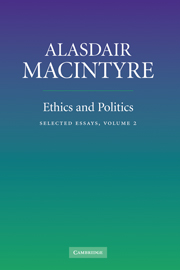Book contents
- Frontmatter
- Contents
- Preface
- Acknowledgments
- PART I LEARNING FROM ARISTOTLE AND AQUINAS
- 1 Rival Aristotles: Aristotle against some Renaissance Aristotelians
- 2 Rival Aristotles: Aristotle against some modern Aristotelians
- 3 Natural law as subversive: the case of Aquinas
- 4 Aquinas and the extent of moral disagreement
- PART II ETHICS
- PART III THE POLITICS OF ETHICS
- Index
1 - Rival Aristotles: Aristotle against some Renaissance Aristotelians
Published online by Cambridge University Press: 27 January 2010
- Frontmatter
- Contents
- Preface
- Acknowledgments
- PART I LEARNING FROM ARISTOTLE AND AQUINAS
- 1 Rival Aristotles: Aristotle against some Renaissance Aristotelians
- 2 Rival Aristotles: Aristotle against some modern Aristotelians
- 3 Natural law as subversive: the case of Aquinas
- 4 Aquinas and the extent of moral disagreement
- PART II ETHICS
- PART III THE POLITICS OF ETHICS
- Index
Summary
A systematic history of Aristotelianism would be an immense undertaking populated by a great variety of rival Aristotles: Theophrastus's, the Aristotle of the Neoplatonists, a whole range of medieval Aristotles – Farabi's, ibn Rushd's, Maimonides's, Aquinas's – and after them an equally impressive set of Renaissance Aristotles, followed by Coleridge's, Thomas Case's, and the whole variety of twentieth-century Aristotles from Werner Jaeger to Terence Irwin and beyond. I shall deal only with a very small selection from this set of rival Aristotles and even with them I shall be concerned only with a limited set of issues, issues concerning the relationship of moral and political theory to moral and political practice and of both to moral education.
Towards the end of the tenth book of the Nicomachean Ethics Aristotle argues that arguments by themselves are insufficient to make human beings good. Arguments may encourage and incite those of the young who already have some propensity for virtue – they may have, that is to say, rhetorical power. But with the majority they do not even have this kind of power and indeed it is one of the marks of already achieved goodness to be willing to submit to argument. So practical habituation in the exercise of the virtues has to precede education in moral theory. But it is not just that such habituation is required for those who are to be able to understand and be responsive to argument.
- Type
- Chapter
- Information
- Ethics and PoliticsSelected Essays, pp. 3 - 21Publisher: Cambridge University PressPrint publication year: 2006
- 3
- Cited by



